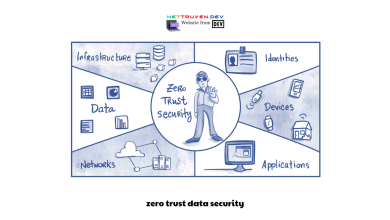The Future of Data Management: Trends, Challenges, and Opportunities

In today’s digital age, data is the lifeblood of businesses. It drives decision-making, reveals insights, and enables companies to stay competitive in an increasingly crowded marketplace. However, with the vast amount of data being produced every day, managing it has become a daunting task. This is where data management comes in.
Introduction: The Importance of Data Management in the Digital Age

Definition of Data Management
Data management refers to the process of collecting, storing, organizing, maintaining, and utilizing data throughout its lifecycle. It encompasses various activities such as data governance, data integration, data quality, and data security.
Why Data Management Matters
Data is a valuable asset that can help businesses make informed decisions, improve customer experience, and drive growth. However, without proper management, it can become a liability. Poor data quality, security breaches, and compliance issues can all lead to reputational damage, legal liabilities, and financial losses.
Overview of the Current State of Data Management
Currently, data management is facing various challenges such as data proliferation, data silos, and the lack of skilled professionals. At the same time, new trends such as machine learning, blockchain, and data analytics are shaping the future of data management. As we move forward, it is essential to understand these trends and challenges to take advantage of the opportunities that data management offers.
Trends in Data Management: What’s Changing and What’s Coming

Data management is an ever-evolving field, and keeping up with the latest trends and technologies is crucial for businesses to stay competitive. Here are some of the most significant trends in data management.
The Rise of Machine Learning and Artificial Intelligence
Machine learning and artificial intelligence (AI) have been transforming the way we manage data. These technologies can help automate data processing, identify patterns and insights, and improve decision-making. With the increasing amount of data being generated, machine learning and AI can help businesses make sense of it all.
The Emergence of Blockchain Technology
Blockchain technology has gained significant attention in recent years, and it has the potential to revolutionize data management. With its decentralized and secure nature, it can help ensure data privacy and security, eliminate intermediaries, and enable faster and more efficient transactions. As more companies adopt blockchain technology, it will undoubtedly impact the way we manage and share data.
The Increasing Importance of Data Privacy and Security
Data privacy and security have always been critical concerns in data management, but with the rise of cyber threats and data breaches, they have become even more crucial. Businesses need to implement strong security measures and comply with regulations such as GDPR and CCPA to protect their customers’ data. Failure to do so can result in severe consequences such as legal liabilities and reputational damage.
The Growing Demand for Data Analytics and Business Intelligence
Data analytics and business intelligence have become indispensable tools for businesses to gain insights, make informed decisions, and stay ahead of the competition. With the increasing amount of data being generated, the demand for skilled data professionals who can analyze and interpret this data continues to grow. As businesses adopt a more data-driven approach, data analytics and business intelligence will become even more critical in the future.
Challenges in Data Management: What Needs to Be Addressed
Data management is a complex and ever-evolving field that presents many challenges. In this section, we will look at some of the most pressing challenges facing data management today and explore possible solutions.
The Complexity of Data Integration and Migration
One of the most significant challenges in data management is integrating and migrating data across different systems and platforms. Data integration involves combining data from multiple sources into a unified view, while data migration refers to the process of moving data from one system to another.
To address this challenge, businesses need to invest in tools and technologies that can simplify data integration and migration, such as data integration platforms, cloud-based solutions, and APIs.
The Need for Better Data Governance and Compliance
Data governance and compliance are critical aspects of data management that ensure data is managed ethically, legally, and securely. However, many businesses struggle with implementing effective data governance policies and complying with regulatory requirements such as GDPR and CCPA.
To address this challenge, businesses need to establish clear data governance policies, appoint data stewards and establish data governance committees. They also need to use data management solutions that can help them comply with regulatory requirements.
The Lack of Skilled Data Professionals
Another significant challenge in data management is the lack of skilled professionals. Data management requires a range of skills, including data analysis, data modeling, data integration, and data governance. However, there is currently a shortage of professionals with these skills.
To address this challenge, businesses need to invest in training and development programs for their employees. They can also consider partnering with universities or hiring external consultants.
The Difficulty of Managing Unstructured Data
Unstructured data, such as social media posts, emails, and images, presents a unique challenge in data management. Unlike structured data, unstructured data does not fit neatly into databases and requires specialized tools and technologies to manage effectively.
To address this challenge, businesses need to invest in tools and technologies that can help them manage and analyze unstructured data effectively, such as text analytics software and natural language processing tools.
Best Practices in Data Management: How to Succeed in the Future
In the digital age, data is an essential asset that can drive business growth and innovation. However, managing data effectively requires a strategic approach and adherence to best practices. Here are some tips to help you succeed in data management:
Establish Clear Goals and Objectives
Before embarking on any data management initiative, it is essential to establish clear goals and objectives. This will help you determine what data you need to collect, how to store and organize it, and how to use it to achieve your business objectives. It is also important to define key performance indicators (KPIs) to measure the success of your data management efforts.
Invest in the Right Tools and Technologies
To manage data effectively, you need the right tools and technologies. This includes data management software, data integration tools, data analytics platforms, and data visualization software. Investing in the right tools can help you automate processes, improve data quality, and gain insights from your data more efficiently.
Build a Strong Data Management Team
Managing data requires a skilled team of professionals who can handle various aspects of data management such as data governance, data architecture, and data security. Hiring the right people and building a strong data management team can help you ensure that your data is managed effectively and efficiently.
Emphasize Data Quality and Accuracy
Data quality and accuracy are critical to the success of any data management initiative. Poor data quality can lead to incorrect insights, flawed decision-making, and lost opportunities. It is essential to establish data quality standards, perform regular data audits, and implement data cleansing and enrichment processes to ensure that your data is accurate and reliable.
By following these best practices, you can ensure that your data management initiatives are successful, and your business can reap the benefits of data-driven decision-making and innovation.
Conclusion: Embrace the Future of Data Management
As we have seen, the future of data management is full of opportunities and challenges. By embracing new technologies and best practices, businesses can unlock the full potential of their data and gain a competitive edge. However, this requires a concerted effort from all stakeholders involved in data management, from executives to data professionals.
It is crucial to establish clear goals and objectives, invest in the right tools and technologies, build a strong data management team, and emphasize data quality and accuracy. By doing so, businesses can create a data-driven culture that fosters innovation, collaboration, and growth.
In conclusion, data management is no longer a nice-to-have but a must-have for businesses that want to thrive in the digital age. By keeping up with the latest trends and addressing the challenges, we can unlock the full potential of data and create a better future for all.
Conclusion: So above is the The Future of Data Management: Trends, Challenges, and Opportunities article. Hopefully with this article you can help you in life, always follow and read our good articles on the website: nettruyen.dev




